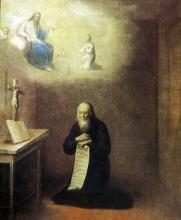22 April / 5 May
 St. Vitaly was born in the latter part of the 6th century. As a youth, he entered the Monastery of Venerable St. Seridus near the town of Gaza in the Holy Land, and there over the course of many years led a strictly monastic life. At the age of 60, Vitaly left his monastery, and moved to Alexandria. At the time, the Church of Alexandria was under Patriarch John the Merciful (609-620), renowned for his holy way of life.
St. Vitaly was born in the latter part of the 6th century. As a youth, he entered the Monastery of Venerable St. Seridus near the town of Gaza in the Holy Land, and there over the course of many years led a strictly monastic life. At the age of 60, Vitaly left his monastery, and moved to Alexandria. At the time, the Church of Alexandria was under Patriarch John the Merciful (609-620), renowned for his holy way of life.
In Alexandria, Vitaly took upon himself the quite unusual spiritual struggle of saving the prostitutes of that city. Living in a private apartment, Monk Vitaly worked as a day-laborer, and in the evenings visited houses of ill repute. Entering the room of a given errant woman, he would give her his earnings, and try to persuade her to leave her corrupt way of life. Then Vitaly would get on his knees and, while the woman slept, would pray to God throughout the night. It often happened that the woman, touched both by his words and by his fervent prayer, would be brought to repentance, and would also fall to her knees and begin to pray. In the morning, before going off to work, Vitaly would have the woman promise to keep the details of his visit in confidence. Vitaly had a notebook in which he recorded the names of all of the fallen women known to him. He constantly remembered them in prayer.
Vitaly carried on this unusual way of life for several years. The people of the city became indignant over the monk's seemingly unbecoming behavior and reviled him. It happened that one scandalized youth struck Vitaly on the neck and exclaimed, “You shame the monastic rank and Christianity.” St. Vitaly humbly endured all of the scorn, ridicule, and even blows, and asked the offenders not to condemn him. Ultimately, the clergy of Alexandria complained about Vitaly to Patriarch John, and insisted that he take necessary action against him. However, the Patriarch left their demands unanswered.
By then, Vitaly's kind words, prayers and righteous life had borne fruit and had had an effect on the lives of many fallen women. Some went off to the monastery, others married, and others began to engage in honest labor.
After Venerable St. Vitaly reposed, he was found kneeling before an Icon. He was holding a sheet of paper on which was written, “Residents of Alexandria! Condemn not your neighbor, no matter how sinful he might seem to you. Judge no one prior to the Judgment of God.” Before Vitaly's funeral, the women whom Vitaly had put on the right path assembled to tell Patriarch John and many other people about Monk Vitaly's virtuous life. Many people became ashamed of themselves for having offended a righteous man. Patriarch John himself committed St. Vitaly's remains to the earth. During and after the funeral, many sick people were healed by touching St. Vitaly's holy relics.
Thus did St. Vitaly's unusual podvig teach many not to rush to judge others. In fact, we can see only a person's exterior; we do not know what is in his heart. For this reason it is said, “Judge not, lest ye by judged.”
